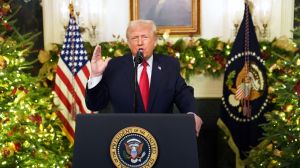Why FCRA needs a quick burial
The much awaited visit of the Prime Minister to the US has begun. The visit has been well prepared considering that:8226; ENRON, a perennia...

The much awaited visit of the Prime Minister to the US has begun. The visit has been well prepared considering that:
8226; ENRON, a perennial investor irritant has been more or less resolved;
8226; We have signed an open skies policy on civil aviation and other reforms in this sector has meant huge orders for Boeing;
8226; A framework agreement to enhance defence co-operation has been signed during the visit of the Defence Minister;
8226; Successive interactions of Foreign Minister and NSA have helped the roadmap for the next steps on strategic partnership;
8226; The interlocutor on US economic dialogue, Montek Ahluwalia, has worked out the contours for enhanced co-operation in nuclear energy, non-conventional energy and increasing US investment in India;
8226; Earlier visits by Ministers Kapil Sibal, Kamal Nath and host of others have laid the foundation for increasing co-operation in Science 038; Technology and greater co-operation in the ongoing WTO negotiations.
Promises made in the past have been substantially redeemed and irrespective of their stance on the UN Security Council expansion, the Indo-US co-operation has entered a new intensive phase. The Prime Minister8217;s visit will deepen this process notwithstanding the caveats by the Left and disclaimers even before the visit began.
There is, however, one area where progress has been zero if not negative. During the visit of former Prime Minister Atal Behari Vajpayee, the Indian diaspora, particularly from the affluent Silicon Valley, had pleaded for the scrapping of the Foreign Contribution Regulation Act FCRA. Instead of scrapping, its obnoxious features got worse. Fears that money could incentivise conversions stymied any action. Fortunately, one obnoxious regulation making it compulsory for any contribution aimed for educational institutions going to a Bharat Shiksha Kosh, overlooking that such contributions to the alma mater was a way of repaying back, was scrapped by the new government.
The FCRA was introduced in 1976 as an Act to 8216;8216;regulate the acceptance and utilisation of foreign contributions/ donations or foreign hospitality of certain persons or associations with a view to ensuring that parliamentary institutions, political associations and academic and other voluntary organisations as well as individuals working in important areas of national life function in a manner consistent with the values of sovereign democratic republic.8217;8217; Notwithstanding the unexceptionable although somewhat pompous objective, in practice its application has been detrimental in multiple ways.
The Act is administered by the Ministry of Home Affairs. The Foreigners Division of MHA is a bureaucratic web scrutinising thousands of applications; a vestige of the 8216;8216;permission culture8217;8217;. Some 23,000 associations stand registered under the FCRA and roughly 700 associations get permissions each year and over 14,598 such associations filed returns in 2001-02 alone. The Act regulates a spectrum of activities:
1 International conferences: Organisers wanting to hold a conference in India will be required to submit a proposal containing topics to be covered, venue of the event, list of participating countries with nationalities, background of the participants, subject matter likely to be discussed. The proposal must be sent to the nodal ministry administrative ministry which will secure the permissions of the Ministries of Home Affairs and External Affairs. Strangely, a circular of 2001 also stipulates 8216;8216;that foreign participation should not generally be considered8217;8217; for conferences of a political, semi-political or sensitive technical subjects. So much for our faith in the globalisation process.
2 Similarly, individual foreign scholars wanting to undertake research must make a separate application for getting their research projects approved by the government. So much for academic freedom.
3 Foreign contribution needs prior approval. Foreign contribution covers donation, delivery or transfer made by any foreign source, of any article, not being an article given to a person as a gift for his personal use, if the marked value, in India, of such article on the date of such gift, does not exceed one thousand rupees.
4 Similarly, on foreign hospitality, the Act stringently defines, any offer, not being a purely casual one, made by foreign source for providing a person with the costs of travel to any foreign country or territory or with free boarding and lodging, transport or medical treatment needs approval. The foreign source includes any foreign government or its agency or a foreign company with the exception of international agencies. It includes trusts, societies, associations or individuals, a foreign foundation, any organisation financed by a foreign country including foreign educational trusts wanting to offer scholarships to Indian students. So much for our belief in an increasingly integrated world.
5 Scholarships: According to the Act, every citizen of India who receives any scholarship, or any payment from any foreign source, shall submit within such time as may be prescribed, an intimation to the Central Government on scholarship received from the foreign source, the purpose and the manner in which such scholarship has been utilised. So much for fostering a knowledge economy.
6 My media friends know the woes of a correspondent, columnist, cartoonist, editor, owner, printer or a publisher in accepting any foreign contribution. It is feared that their views may be subverted.
7 The Indian diaspora finds the Act even more onerous because currently contributions from NRIs to corporate sector come under the Foreign Exchange Maintenance Act, while non-corporate organisations are under the ambit of the FCRA. FERA was repealed some time ago and FEMA which was its replacement looks into foreign exchange utilisation for business purposes. However, even philanthropic activities are clubbed under FCRA and contributions do not get any tax exemption for the donations given by them. Action on Singhvi Committee8217;s recommendations has been tardy.
The FCRA is an archaic legislation. Even as India has become increasingly globalised, this Act reflects undue diffidence. It is a part of a misplaced paranoia that foreigners are busy conspiring to destabilise us and even self-respecting Indians and recognised academic institutions can be so easily subverted. Every country must protect attempts to subvert institutions and, given enhanced security concerns, keep a firm check on suspect money.
There are, however, other means to achieve this unexceptionable goal. Several existing laws like the Money Laundering Act, Foreign Exchange Management Act and other legislations under the control of Ministry of Home Affairs can be strengthened to meet this objective. The FCRA deserves to be scrapped. Democratic institutions and our pride in preserving an 8216;8216;open society8217;8217; need repeated vindication. Can we arrange a decent but quick burial for this outmoded law?
Write to nksinghexpressindia.com
- 01
- 02
- 03
- 04
- 05































